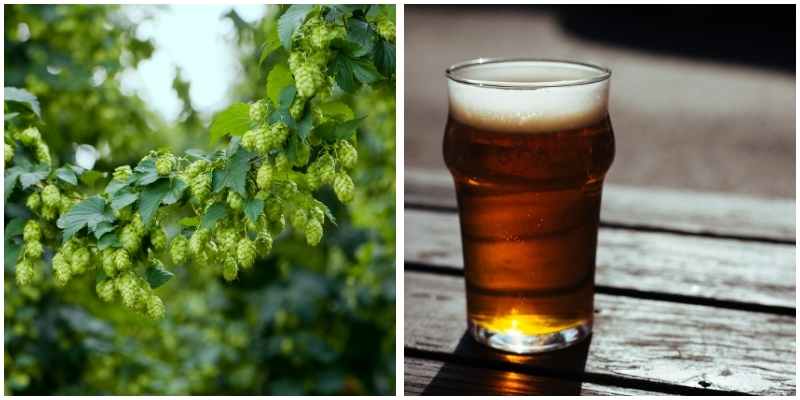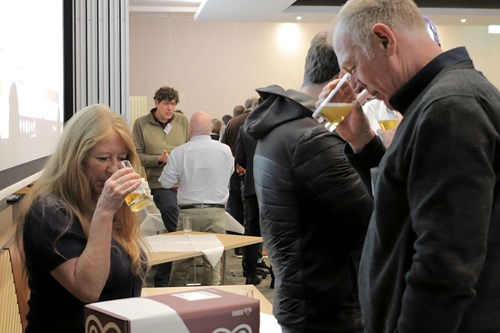On the search for sustainable British hop varieties

Kent has a long, rich tradition of hop growing, with picturesque oast houses being a distinctive feature of its landscape. British hop growing has faced many challenges, with the number of hectares harvested in the UK more than halving since 2011. Today, over 90% of the hops used to brew beer in the UK are now imported from overseas.
At the Hops Technical Day held on 27th February 2024 at the University of Kent, promising new technical developments were presented from the UK breeding programmes, as well as an announcement of over £500,000 in new research funding, which could help boost the sector's fortunes.
Market influences on hops
Throughout the day, attendees heard about the various factors that have impacted the sector. The beer market has seen a significant popularity spike in craft brewing, with consumers looking for citrusy, punchy aromas. These new flavour profiles are not currently available in our existing hop varieties that are grown in the UK, our old-style British hops are more suited to brewing the traditional ales.
The problem has been compounded by two further factors. Covid was catastrophic. The closure of pubs and hospitality meant the market for hops was no longer there, and production in the UK was drastically cut back and is yet to recover to pre-pandemic levels.
The cost-of-living crisis is now causing further damage to the hospitality trade, with many pubs closing and volumes of beer sales being hit. The number of pubs in the UK has declined from around 60,000 in 2000, to 45,000 in 2023.
Research innovation for the future of the hop industry
Collaborations between scientists and industry are striving to address these challenges, by breeding new varieties of hops that can not only respond to changing market conditions but that are also resilient to future climate pressures.
Dr Helen Cockerton is a Growing Kent & Medway Research Fellow at the Biotechnology Hub at the University of Kent. A specialist in plant genetics, Helen is supporting the UK hop breeding programme run by Dr Klara Hajdu at Wye Hops.
Their priority is to understand the DNA that controls the crops’ traits. Scientific advances are enabling Helen and Klara to identify which genes control different plant traits. By studying hop DNA, they can investigate which genes affect how tall it grows, how resistant the plant is to certain pests or diseases, or genes that change its flavour and aroma. Understanding and identifying these genes means they can select the right parent plants to breed new varieties, with the traits that both the growers and brewers need.
Securing new funding for ‘super hop’ research
In a major boost for the hop sector, the team has secured £574,000 in research funding from Innovate UK. The funded grant project aims to use traditional breeding methods (informed by this new research into hop DNA) to develop new varieties of environmentally resilient ‘super hops.’
It can currently take over 10 years to bring a new variety into commercial production. However, by incorporating cutting-edge genetic techniques, the hope is to breed new varieties more quickly, giving the UK industry a competitive advantage.
A particular focus will be on breeding varieties that are resistant to a disease called Verticillium wilt. This disease can wipe out entire hop gardens within a season.
Another factor that has not previously been bred into British hop varieties is tolerance to drought. Climate change is likely to bring hotter, drier summers. Growers, particularly in the southeast of the UK, will need varieties that can cope with these new environmental pressures.
Selecting aromas and flavours that meet customer demands will also be another priority for the research. If successful, the hope is to both offset the volume of hops being imported with British grown crops and give UK growers access to export into global hop markets.
Attendees at the Hop Technical Day taste beers developed by Gadds' using British hops

Dr Hajdu said, “Through this collaboration, we are not only addressing important issues such as the development of climate-resilient British hop varieties, but we’re also re-establishing a dynamic, research-driven hop breeding programme capable of future-proofing the UK hop and brewing industries in the face of evolving challenges.’
Dr Cockerton added, “The tools we will develop through this project will enable us to generate better hops faster than we could achieve through using old-fashioned approaches alone.”
The Innovate UK project builds on a smaller collaborative research project between University of Kent and Wye Hops, funded by a Growing Kent & Medway Business Innovation Voucher. That project specifically focused on developing new techniques to identify powdery mildew resistance genes for hops, which has led to promising results.
The power of collaboration
The role of a plant breeder is challenging. It requires weighing up the needs of the growers – focusing on how plants respond to their growing conditions like water, pests and plant health, with the needs of the customer and markets, balancing flavour and taste. Having a crystal ball to predict what other challenges may be coming through in future years would help! If successful, the improvements in our understanding of genetics in hops could help to speed up the breeding process and enable the industry to be more responsive to emerging opportunities and future threats.
The Hops Technical Day was held on 27th February 2024 in Canterbury and organised by Wye Hops and University of Kent, supported by Growing Kent & Medway.
The research project ‘Genetic Informed Breeding of Environmentally Resilient UK Hop Varieties’ is a five-year project, funded by Innovate UK.
